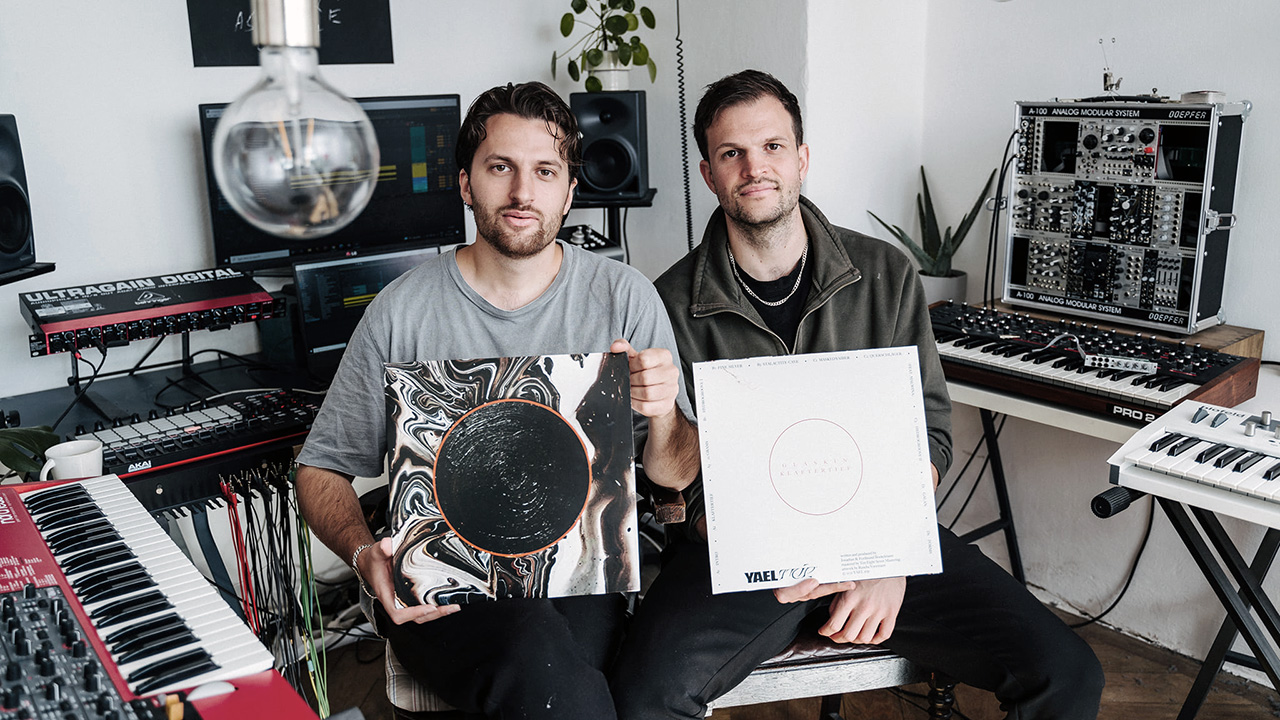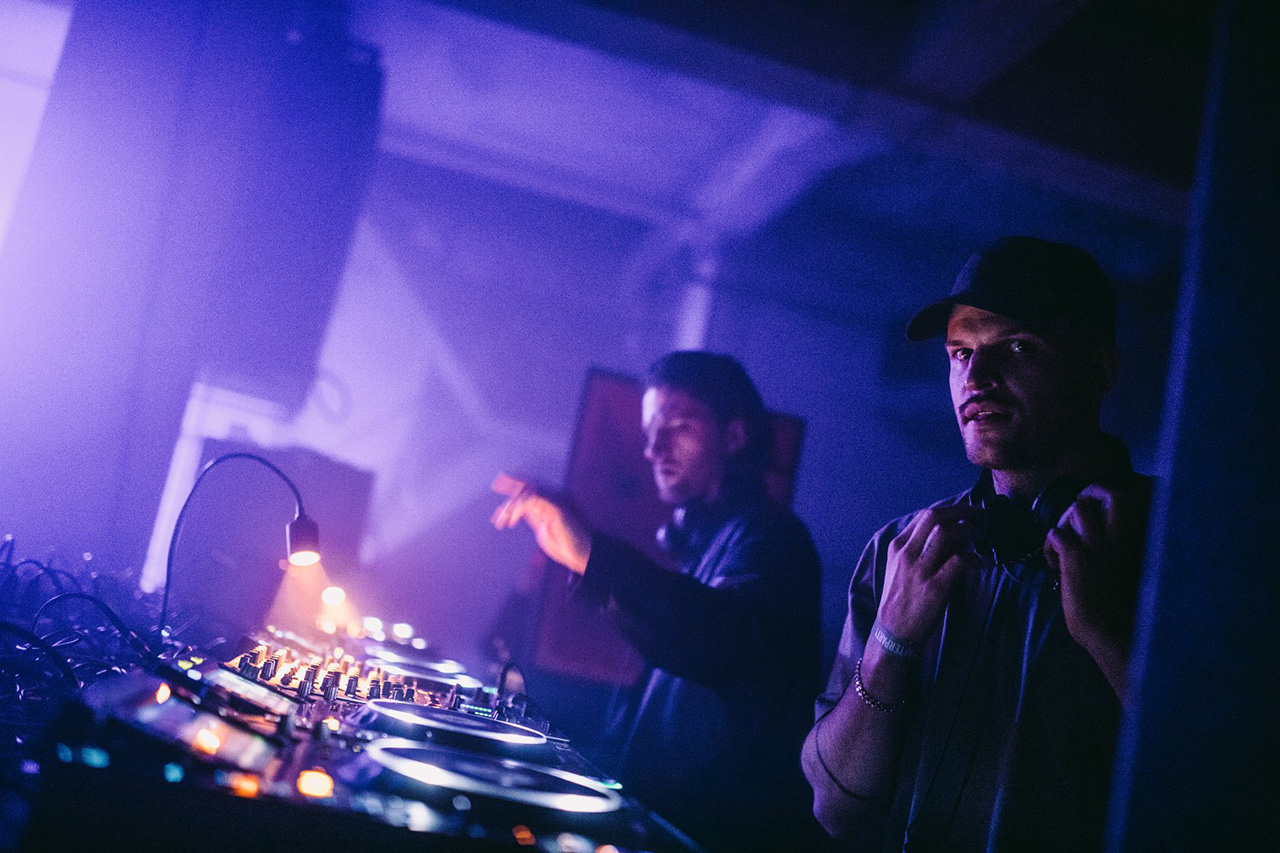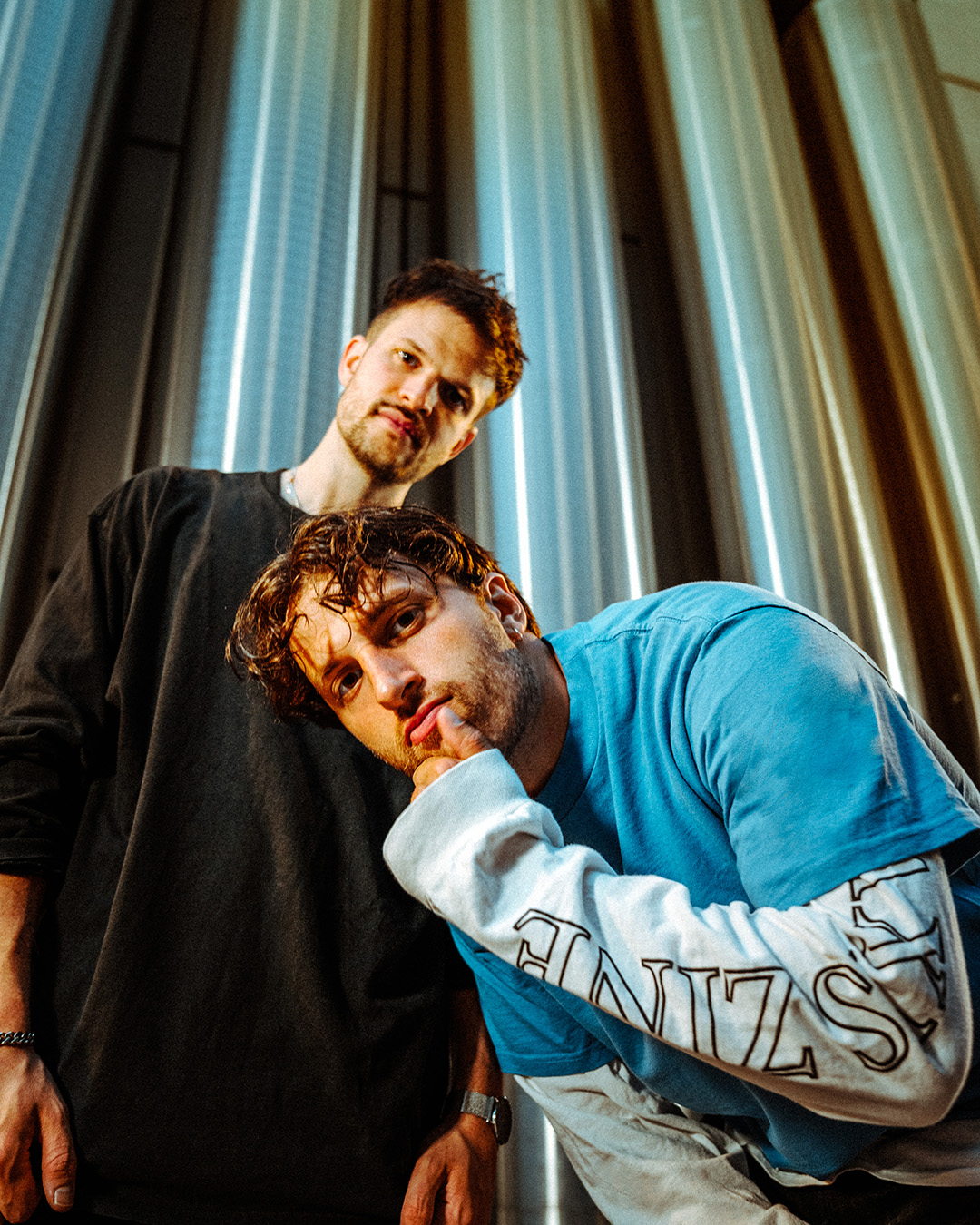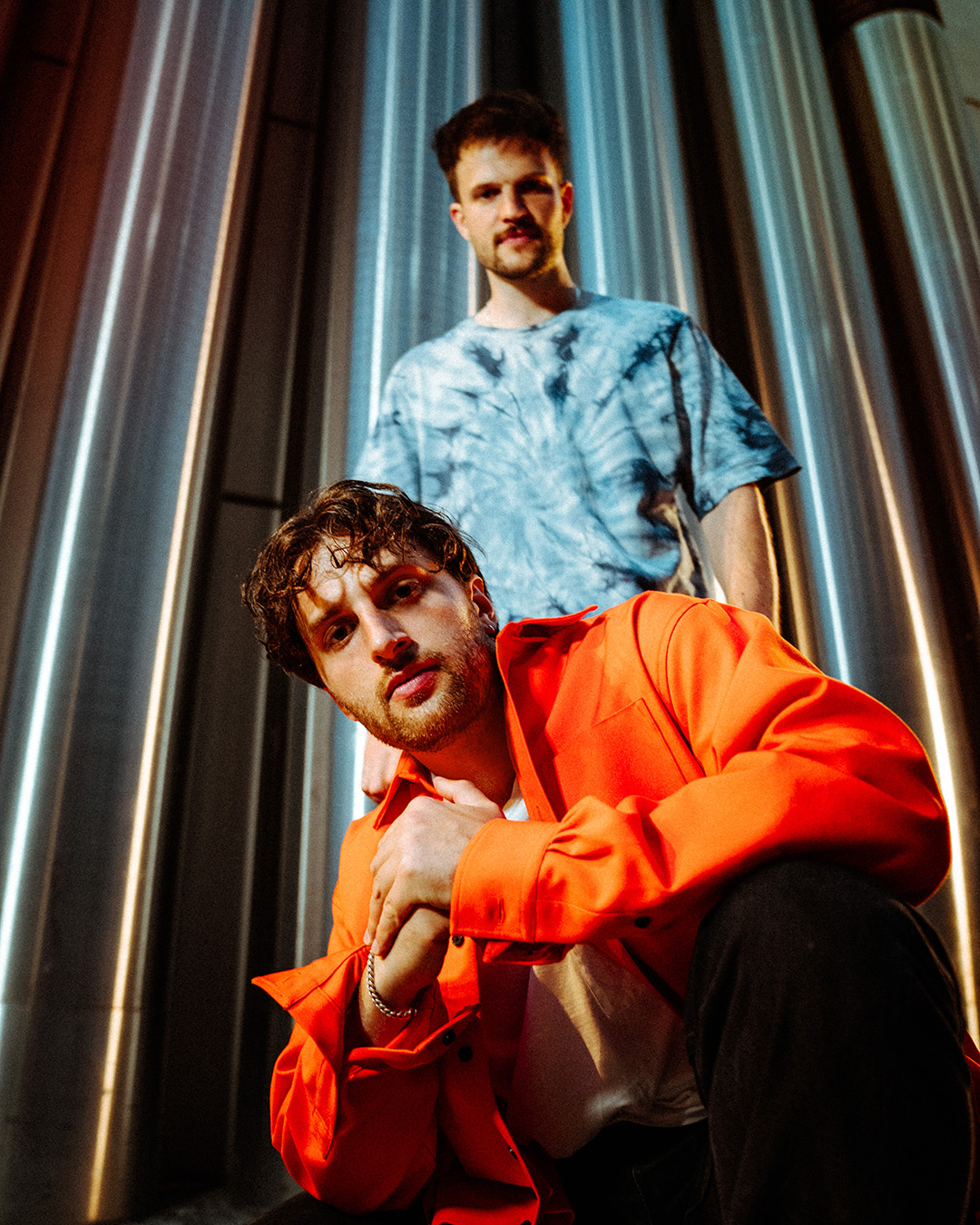
Ferdinand and Jonathan, thank you very much for your time. Let’s start at the beginning, with your musical origins. You grew up in a house surrounded by music, your mother is a pianist and she encouraged you to start playing music. Jonathan started with the violin and then moved on to the guitar and Ferdinand sat on the drum stool. Then you formed a Metal band called Obsessed… What were those early formatives and learning years like?
We see you did quite some research here, that’s nice. Those years have been incredible because we didn’t worry about a thing. We just took our tools to make music and dreamed of performing like our idols did. It was a time of no fear, endless jam sessions and a lot of experimenting.
Later on, Jonathan takes the classical guitar path and Ferdinand starts to play the turntables. What was the journey in that second stage until embracing electronic music as a duo, what reasons or events lead you to get together?
Jona: It was actually an important journey for both of us. When I got in to the music conservatory, I dove deep in to the classical music scene. Learned everything from music theory, ear training to characteristics of all different music epochs, reaching from renaissance to modern. Something I realized though was that only very few of my colleagues were interested in any other genre than classic. So, I had a lot of interest for what my brother was doing at the moment. He was in another world I hadn’t known much of until then. It was all about electronic music, dancing, loud speakers and something that much more important: the audience was a much younger one than the one I knew from the classical world. It was music that was much more on the pulse of time. So, one day we thought, let’s join forces again and have a look if we can bring out the best of both worlds from us.
There is something we love to know about the artists we interview in 1051 Magazine… tell us about those first records you bought, some that made you change your perspective about music, that inspire you to be a DJ and a producer…
Ferdi: The first Record I owned was one of the Neo Pop VA Samplers, the one from 2001 with the Red Cover. One of our older sisters gave it to me as a Birthday present. There were many good tracks on it but Fischerspooner’s Emerge was probably my favourite song for several years and had a big Influence on my taste in Music! And while being the older one of us, I passed everything I experienced on to Jona. Even though we had different interests for some time later on, music always has been the one thing we had in common.
Glaskin was born as such around 2014, if we are not mistaken, that name already appears on posters. A couple of years later you are already residents at the Kong Club in Munich, and a couple of years later at the prestigious Blitz, where you maintain that residency. The Blitz seems like a real paradise for any DJ, with that sound, the design… a marvel. How is the club scene in Munich? How would you describe it to someone who has never been there?
First of all, Munich has a certain reputation of being very snobby and rich, which it is in some parts. But there is also another, very wild and young side to the city. And that you can really feel when visiting Blitz, there is always a special energy in the room and no party is like the other. The best thing you can see everyone become a unit and stick together for this one night. Especially since everything reopened you can see how everyone enjoys every last bit of a party.

Apart from the Blitz, which I imagine is a bit like your home, which clubs have you liked the most or have surprised you for whatever reason?
One of our first international show we played was Kompass Club in Belgium. Our flight was late and we almost missed our slot. We had no Idea what to expect. So, we rushed from the airport directly to the venue. When we got there, we expected to play in a club. But we arrived at a huge warehouse, which was completely empty when we started to play, as it was the opening slot. But 20 min into our set there where around 2000 people dancing in front of us, we couldn’t believe what was happening.
Let’s go now to the studio. It’s obvious that your musical training from very early on would´ve helped you in this field. A few questions about this… What are your favourite gadgets when creating… hardware, VST…? Can you tell us a bit about your creative process?
Jona: That’s a good question because Ferdi & I tend to work in a different way.
I am more of a hardware kind of guy. I need synthesizers, modular systems, drum machines and so on in front of me in order to be creative. Ferdi is definitely more into creating, producing and working with software programs. Which is actually a great fit for both of us. My favorite gadget might be our modular system. Couldn’t live without some analogue Phazers like the Kamieniek from XAOC or the Granular Synthesis Module “Beads” by Mutable Instruments. The whole system is just a great external effect device where you can send through any audio you recorded and spice it up as much as you want to. Ferdi’s favorite VST might be the Devastor 2 by D16 Group and he works a lot with samples and Ableton Plug-Ins.
Your first release came in 2017 and it was on Hotflush Records, which is not bad for a debut EP (and with a track remixed by the boss, Scuba). After releasing another EP the following year, in 2019 your third release comes out, but this time on your own label, Yael Trip.
What led you to create your own label (which, until now, has only served as a vehicle for your sound artefacts)? Where did the name of the label come from?
We saw that a lot of artists around us changed their sound in order to release on other labels. We didn’t want to do that. We had this feeling that the importance of big labels – especially for using them as a platform for pushing your career – were not as important as they used to be. We believe in making good music will ultimately bring you your following. So, we wanted to make or own our label to have the freedom to do whatever we perceive as good. For the name of the label we searched for a name for a fictive character (“YAEL”) who’s “trip” is described by the music we release on the label. That’s the whole concept of it! Since we get a lot of support for our label by artists we admire, we think about starting to release music from other artists as well and by doing building a community around the label.

Although you are always defined as Techno, in your recordings there is an important search for other styles, like Electro (in Ratunek, for example) or in productions like Querschläger, a track by Klaftertief. Do you like to move in different terrains, navigate through different styles both in DJing and producing?)
If you check our discography, it’s something we always did from the very first release on. We just like different styles of music and love to combine these in an intelligent way. On the EPs we keep it more techno & club-oriented though. The LP was our first big project where we explored even more different styles and thus had much more freedom. But when we play in a club, we want to make the audience dance and have a good time. So, we try to listen and feel what people need in front of us. We love to play a proper Techno set!
Let’s talk about that album, Klaftertief. Personally, I have perceived a careful conception of how the work was going to be as a whole, the final result. How was the process of dealing with your first full-length release? Was it partly gestated during those months of isolation due to Covid?
Actually yes, that’s true. In the beginning of 2020, you could already feel that this whole thing will take longer. So, we got back to where we came from: making music. No gigs mean studio time. On March 15th 2020 – the first lockdown in Munich in 2020 – we started producing the album and it was a guideline throughout this tough time. it was what got us out of bed in the morning and kept us going. The process was very exciting because we set ourselves different goals every day. One day we were just improvising on a synth searching for an interesting, catchy synthline, the next day we were slicing recorded samples until they started to make us dance in the studio. Most of the recording period we spent in front of our modular system, though. It gave us so much inspiration, a certain kind of randomness that we were searching for and effortless, joyful music making in general.
Obligatory questions to DJ’s and producers who produce or play Techno. Although it is clear that fashions come and go, and that styles such as Techno and House will never disappear, do you think that there is a commercial overexploitation of the label, that anything is labelled as Techno (even if it doesn’t resemble the classic definition of the style)?
In our opinion Techno is probably one of the genres that is developing faster than any other. In the beginning Techno was known for its four to the floor kicks and its futuristic sound design – it was considered as the sound of the future. And even today with all its subgenres and second meanings, Techno is always developing into something new. Sometimes good, sometimes bad but like this everything is constantly shifting and the genre stays fresh and interesting. Of course, there are negative or commercial side effects for example business Techno. Practically the same thing happened to Hip Hop back in the 90s. It was an underground movement in the beginning and then developed into a vast commercial business. We always try to see the positive aspects and not focus on negativity.

Apart from the DJ’s and producers’ side, allow me to make a comment about you as promoters and agitators of the Munich scene. Ferdinand is part of Kellerkind (and as Glaskin you have been part of the events on many occasions), a collective that has been organising a couple of festivals in Munich for a decade now (in the case of Schall im Schilf and since 2013 at Back to the Woods).
We expect them back next summer, 23 July for Schall im Schilf and 27 August for Back to the Woods. Tell us a bit more about these two festivals, how they were born, how they have evolved, their musical philosophy (far from commercial music) and those social projects to which part of the profits of both festivals are destined.
Ferdi: Back in 2012 we really wanted to do a festival, so we tried. To be honest It was a lucky strike, we expected maybe 200 people but there were suddenly 2000 people showing up. We somehow managed to handle everything and we landed big success. We did the right thing at the right time. In the beginning there was no money for a proper line-up, so we just a had a couple of friends at the decks. And in a way we kept that mentality, as we are big supporters of our locals and smaller acts. We always try and mix the stages running order with bigger and smaller names as well as local artists. It keeps things fresh and interesting. By now there is a big Family behind the whole project and every time we start constructing the festival site it feels like a two week holiday camp for all of us. Obviously, the pandemic is hard for any promoter but we work very hard to make it happen in 2022!
Once again thank you very much for your time, it has been a pleasure to get to know Jonathan and Ferdinand aka Glaskin a little bit more, we wish you a lot of success with Klaftertief, with your label and that these two festivals can be celebrated again next summer without any problem.
Klafterkief is available on 2×12″ vinyl and digital here and you can get Schall im Schilf and Back to the Woods tickets and info here